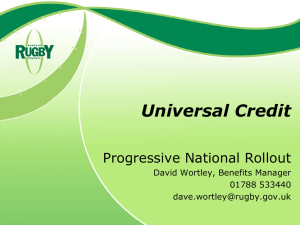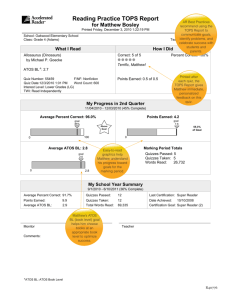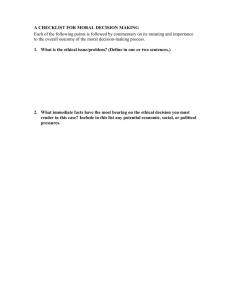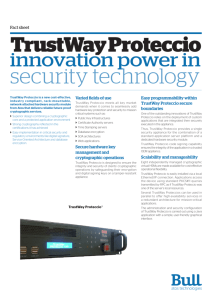Sample written test
advertisement
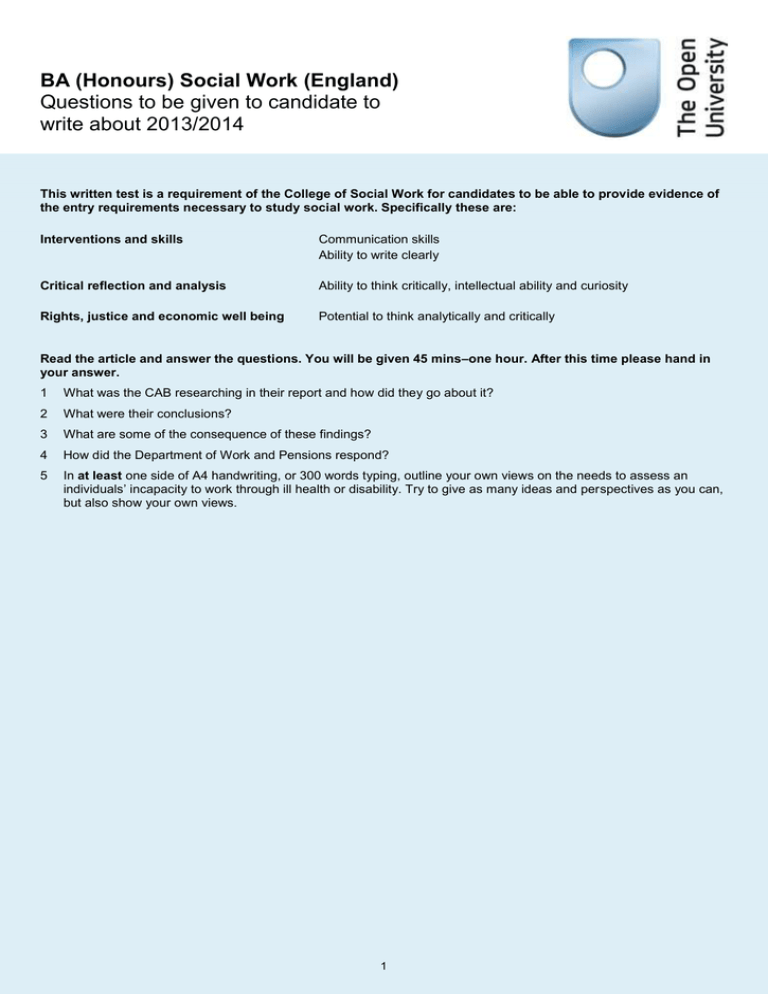
BA (Honours) Social Work (England) Questions to be given to candidate to write about 2013/2014 This written test is a requirement of the College of Social Work for candidates to be able to provide evidence of the entry requirements necessary to study social work. Specifically these are: Interventions and skills Communication skills Ability to write clearly Critical reflection and analysis Ability to think critically, intellectual ability and curiosity Rights, justice and economic well being Potential to think analytically and critically Read the article and answer the questions. You will be given 45 mins–one hour. After this time please hand in your answer. 1 What was the CAB researching in their report and how did they go about it? 2 What were their conclusions? 3 What are some of the consequence of these findings? 4 How did the Department of Work and Pensions respond? 5 In at least one side of A4 handwriting, or 300 words typing, outline your own views on the needs to assess an individuals’ incapacity to work through ill health or disability. Try to give as many ideas and perspectives as you can, but also show your own views. 1 2 Inaccuracies dog 'fit to work' test New study finds disabled people are being wrongly denied benefits after health assessment errors. guardian.co.uk, Tuesday 10 January 2012 17.00 GMT Chris Linacre says the work capability assessment made her feel as though she was regarded as someone ‘just milking the state’. Photograph: Christopher Thomond for the Guardian A detailed year-long study into the coalition government's controversial work capability assessments (WCAs) has revealed new evidence of widespread inaccuracies in the medical reports that help to determine whether individuals are eligible for sickness benefits. The research, conducted by the charity Citizens Advice, identified a group of people about to embark on the process of claiming employment and support allowance (ESA), which replaces incapacity benefit, and followed them throughout the process from the summer of 2010, looking at how their claims were handled and the accuracy of the medical assessments. The report's conclusions are stark: of the 37 individual reports examined, 16 (43%) revealed "serious levels of inaccuracy", and a further 10 contained a "medium level of inaccuracy", a level still significant enough to have an impact on the claimants' eligibility for benefits. Only 11 were entirely accurate or had a low level of inaccuracy. The study, Right First Time?, is the latest in a series of reports highlighting the unreliability of the complex new system, which is meant to determine who is sufficiently fit to work and who is eligible for state benefits. However, the Citizens Advice report is the first attempt to follow a group of claimants through the process, looking in detail at the way they were treated by Atos, the firm contracted to carry out the work capability tests, and analysing how its report matched up with the claimants' assessment of their medical state. Fear and loathing Last summer, the Commons work and pensions select committee said the very mention of Atos Healthcare triggered "fear and loathing" among claimants, and concluded that there had been "failings" in the service provided by the company, which had "often fallen short of what claimants can rightly expect". One MP on the committee described the process as "disastrous". Disability charities, meanwhile, have been very critical of the company's record since the new policy was launched in October 2008. Some terminally ill cancer patients have been told they are fit for work, while other claimants have died from their conditions shortly after being found fit for work (a parliamentary question recently revealed that 31 people had died while awaiting their appeal in the three years to last October). Chris Linacre, who was not part of the Citizens Advice study, is appealing against a decision not to grant her sickness benefits, based on an Atos assessment last October at which she was awarded zero points and classified as totally fit for work. Problems with her spine since her 20s and arthritis mean she was forced seven years ago to give up a long career in adult education, when the pain made it impossible for her to continue with her job. 3 "They [Atos] said I could lift my leg 70 degrees above the ground. I can't do that; even if I lift my leg two inches I'm in excruciating pain," says Linacre. "It said I appeared to have no difficulty in removing my coat; I should have told them how much pain I was in. The report said I had a normal grip, but I can't use a tin opener or peel a potato. It said the muscle tone on my left leg was normal, but I haven't been able to drive a manual car for 12 years because of a weakness in my left leg." Linacre says she told the assessor that she did most of her shopping online, although she was able to go the shops in an emergency, but would be in great pain. The report stated that she had no problems going to the shop to buy milk and walking around for 10 minutes. "I think they expect you to be a Beano cartoon character, with ouch bubbles above your head, but people tend to be stoic. I try not to labour the fact that I'm in pain. I wasn't going to tell them that some days I can't even put my knickers on I'm in so much pain," she says. She had a strong work ethic, but she says her experience with the Atos assessment made her feel as though they saw her "as someone who is just milking the state". Vicky Pearlman, Citizens Advice disability benefits policy officer, says: "Inaccurate medical assessment reports risk undermining the government's welfare reform programme. They create huge difficulties for seriously ill and disabled people who are wrongly found 'fit for work' when they are not." The low rate of accuracy is worrying disability campaigners because the reports used in deciding who should get ESA are also increasingly used to determine entitlement to disability living allowance (DLA) and other benefits. If the government's welfare reforms go ahead as planned, next year the award of ESA will become the main route to all future disability related support. The medical assessment report itself will play a much greater role in deciding entitlement to personal independence payment (PIP) – the successor to DLA. Because so many claimants believe that their medical reports have been inaccurate, there was a 56% rise in ESA and incapacity benefit appeals received by the tribunals service in 2010/11 and there is a long backlog of cases waiting to be heard. The most recent appeal figures show that 39% of appeals against decisions not to award ESA are overturned in the claimant's favour. The Citizens Advice study cites an example where the claimant told the assessor that he was unable to get dressed or shower without help; he later received a summary of the medical report, stating that he managed to "dress and undress without help or aids". In another test, a claimant, who is registered blind, was required to undergo a sight test, and, in a third case, the assessor under-reported the number of times a diabetic person experienced hypoglycaemic episodes, thus making the claimant not eligible for benefit. Radically improved A Department for Work and Pensions spokeswoman says the report does not acknowledge the ongoing changes to the assessment system, designed to iron out some of its flaws. "It is in everyone's interest to get the WCA right, which is why it has been radically improved over the last two years. The system is far better than it was, and we will continue to keep it under review and refine it further." An independent and ongoing review of the first five years of the WCA is being conducted – at the request of the government – by Malcolm Harrington, a former professor of occupational health at the University of Birmingham. The government is introducing the improvements he recommended in his first report in 2010. But claimants are still seeking help with similar issues related to inaccurate reports, despite the changes implemented. The Citizens Advice report recommends that the government should consider imposing financial penalties on Atos for every inaccurate report it produces, and also suggests independent monitoring of the accuracy of the medical assessments. An Atos spokeswoman says: "Atos Healthcare will be carefully considering Citizens Advice's report. The second Harrington report [published last year] acknowledged the improvements made since the assessments referenced were undertaken, and we hope to work with Citizens Advice in the year ahead to drive further improvements in how work capability assessments are carried out." Janet Bardsley Jan 2012 4

